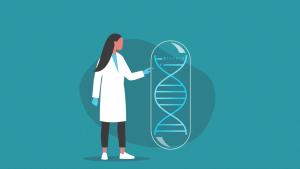Precision medicine
Precision medicine is a medical approach that uses information about a person’s genes, their mutations and other biological data (such as biomarkers) as well as lifestyle habits for the purpose of preventing, diagnosing or treating a disease.
This medical approach has been part of healthcare for many years. For example, a person who needs a blood transfusion is not given blood from a randomly selected donor. Instead, the donor’s blood type is matched to the recipient’s characteristics in order to reduce the risk of complications.
In the case of cancer, precision medicine combines specific information about a person’s tumor to help make a diagnosis, plan treatment, find out how well the treatment is working or make a prognosis. The term is relatively new, and your healthcare providers might use other terms like genomic, DNA, molecular testing, biomarkers, big data analytics or genetic profiling. All these terms belong to the precision medicine language.
Precision medicine in cancer leads to a transition from a “one-size-fits-all patients” approach, in which diagnoses and treatments are based on the type of cancer – as, for example, breast, lung, colon – its size, and whether it has spread, to approaches “tailored to groups of patients” with a specific genetic profile or biomarkers.
Particularly, precision medicine can help in:
- Risk assessment: genetic testing can reveal predisposition to cancer.
- Prevention/early diagnosis: knowing to be at risk for a particular cancer type can help people make decisions about healthy habits, screening tests and other steps towards prevention.
- Diagnosis: detection of cancer at an early stage, when it is potentially easier to treat effectively.
- Treatment: finding out which treatments are potentially safe and effective for each patient and which ones are not.
- Management of disease evolution: monitoring treatment response and disease progression. The advantage could be to allow early treatment of possible adverse events, or enable early detection of disease relapse.
Nowadays, precision medicine mainly relies on scientific innovations in genetics and biology, and uses information from genetic tests and biomarkers. It is worth noting that genetic testing per se does not eliminate a person’s risk for cancer and that, in some cases, the results may turn out to be inconclusive or uncertain.
When it comes to cancer treatments, clinical trials are carried out to study if a particular treatment works in patients with a certain genetic set-up, thus tailoring treatment to the groups of patients carrying a specific mutation.
Basket trials bring about this shift from the “one-size-fits-all” to the “precision medicine” approach in that:
- Tumor biomarkers or genetic mutations are tested to help diagnose cancer or predict the benefits of a given treatment.
- Patients carrying a particular genetic profile are treated with a target therapy, specifically directed to that genetic profile.
It’s important to note that even if the “one-size-fits-all” approach may be effective, the key advantage of precision medicine in oncology is the possibility to properly match the target drug to the patient, helping to improve the patient’s outcome.
Is precision medicine the same as personalized medicine?
The two terms are sometimes used interchangeably. However, “personalized medicine” could be misinterpreted to imply that treatments are being developed uniquely for a single individual, while precision medicine focuses on identifying which approaches will be effective for which patients with specific genetic mutations or tumor biomarkers. For this reason, the use of “precision medicine” is preferable to “personalized medicine”.
Issues with precision medicine
The main issues debated in the field of precision medicine are:
- Ethical, social and legal issues, related, in particular, to privacy aspects and the management of information deriving from genetic tests. As for other testing procedures, genetic testing may reveal findings not related to the reason why your doctor ordered the test. These are called “incidental findings” and you can decide whether to be informed about them or not. You should ask your doctor how incidental findings will be managed. Usually, you can express your wish to be contacted in case of genetic testing with implications for yourself or your relatives, through the informed consent form;
- Costs and availability of genetic tests and target treatments.
Precision medicine approaches are actually not yet part of routine care for most patients. Genetic testing is not an option in some hospitals due to the lack of facilities and because of its high costs. Also, target therapies (link to the glossary, ed) are usually expensive and may be unavailable in some centers. For these reasons, in order to follow a precision medicine approach, you might need to be referred to a specialized cancer center.
What are the potential benefits of precision medicine?
Precision medicine holds promise for the improvement of many aspects of health and healthcare. Potential benefits are:
- Wider access to doctors of patients’ genetic information as part of routine medical care.
- Improved possibility to detect which treatments will work best for specific patients (target treatment).
- Better understanding of the underlying mechanisms of various diseases.
- Providing new approaches for the prevention, diagnosis, and treatment of a wide range of diseases.
- Better integration of electronic health records in patient care; improvement in the sharing of medical data among doctors.
Some benefits should arise in the future, since research is a continuous process in gathering evidence on effective target treatments.




